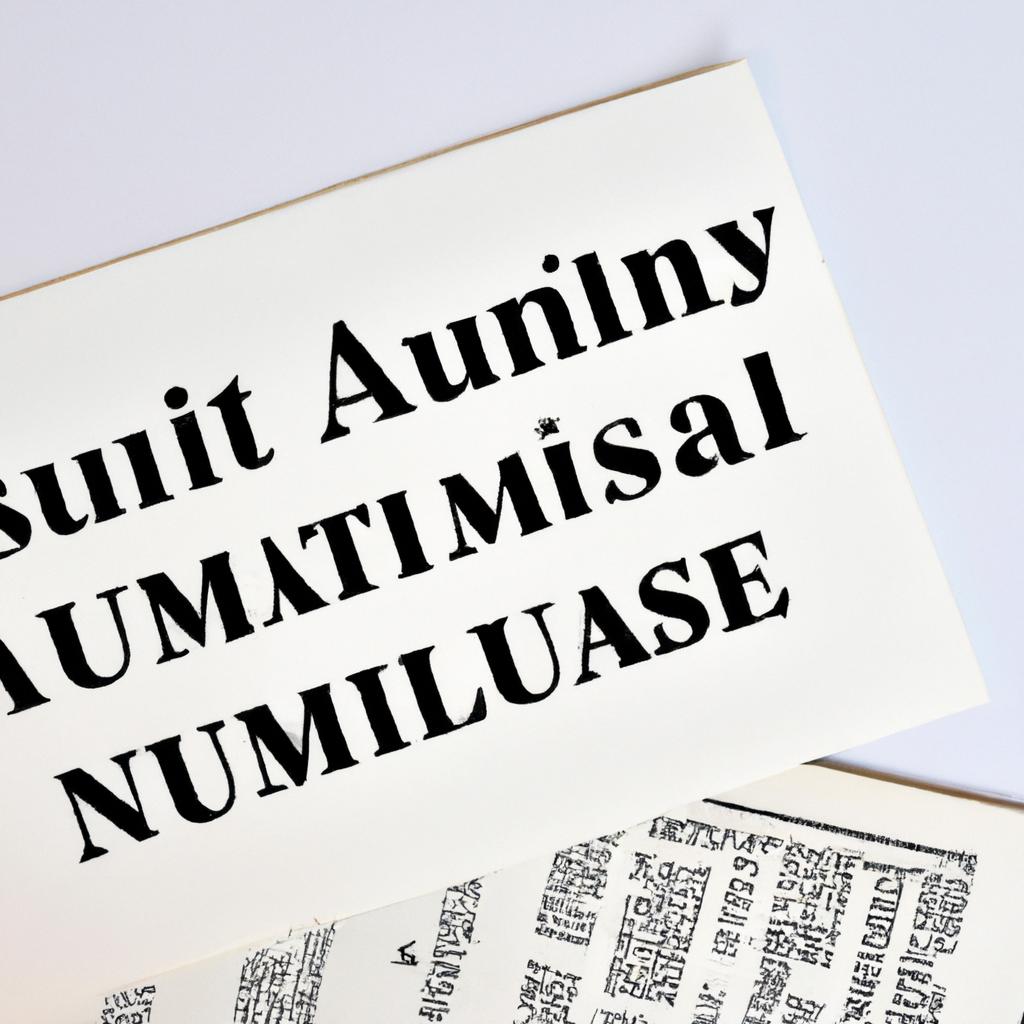In the realm of estate planning and probate law, the concept of posthumous annulment holds a unique significance. This legal procedure allows for the annulment of a marriage following the death of one spouse, presenting a complex and nuanced challenge for families and legal professionals alike. In navigating the intricacies of posthumous annulment, it is imperative to understand the complexities and implications that surround this often misunderstood area of law. At Morgan Legal Group in New York City, our team of experienced lawyers specializes in estate planning, probate, and elder law, offering guidance and expertise in navigating the complexities of posthumous annulment with precision and care.
Understanding the Concept of Posthumous Annulment in Estate Planning
Posthumous annulment is a crucial concept in estate planning that individuals often overlook. It refers to the legal process of canceling or voiding a will or trust after the death of the person who created it. When a posthumous annulment occurs, the estate will be distributed according to state laws on intestacy, which may not align with the wishes of the deceased individual. Understanding the implications of posthumous annulment is essential for ensuring that your assets are distributed according to your wishes.
In estate planning, it is important to consider the potential scenarios that could lead to a posthumous annulment, such as the discovery of a newer will, allegations of undue influence, or issues with the validity of the document. To prevent posthumous annulment, it is crucial to work with experienced estate planning attorneys who can help draft a legally sound will or trust. By taking proactive measures and seeking legal guidance, individuals can safeguard their assets and ensure that their final wishes are carried out without the risk of posthumous annulment.

Key Considerations for Pursuing Posthumous Annulment Proceedings
When considering pursuing posthumous annulment proceedings, there are several key considerations that must be taken into account to ensure the process is carried out smoothly and effectively. An annulment after death is a complex legal matter that requires a thorough understanding of the law and careful planning. Here are some important factors to keep in mind:
- Evidence: It is essential to gather all relevant evidence to support the annulment claim. This may include witness testimonies, medical records, communication records, and other documents that can attest to the invalidity of the marriage.
- Legal Representation: Seeking the guidance of an experienced attorney who specializes in posthumous annulment cases is crucial. A knowledgeable lawyer can navigate the legal complexities of the process and advocate for your interests effectively.

Navigating the Legal Process of Posthumous Annulment with Expert Guidance
Understanding Posthumous Annulment
Posthumous annulment is a legal process that involves nullifying a marriage after one of the parties has passed away. This can be a complex and emotionally charged process, as it involves legal, financial, and emotional considerations. In order to navigate the legal process of posthumous annulment, it is crucial to seek expert guidance from experienced attorneys who specialize in estate planning and family law.
Why Expert Guidance is Essential
When seeking a posthumous annulment, having a seasoned legal team on your side can make all the difference. Expert attorneys can help you understand the intricacies of the legal process, guide you through the necessary steps, and advocate on your behalf in court. With their expertise, you can navigate the complexities of posthumous annulment with confidence and peace of mind, knowing that your interests are being protected every step of the way.

Maximizing the Benefits of Posthumous Annulment for Your Estate Plan
When it comes to , there are several key factors to consider. By understanding the implications and opportunities that posthumous annulment can offer, you can better protect your assets and ensure that your wishes are carried out as intended.
One important aspect to consider is the timing of the annulment. By strategically planning for posthumous annulment in your estate plan, you can potentially reduce estate taxes, avoid probate, and ensure that your assets are distributed according to your wishes. Additionally, by working with a knowledgeable estate planning attorney, you can navigate the complex legal requirements and implications of posthumous annulment to maximize the benefits for your estate.
Q&A
Q: What is posthumous annulment?
A: Posthumous annulment is a legal process in which a marriage is declared null and void after one or both spouses have passed away.
Q: Why would someone seek a posthumous annulment?
A: There are various reasons why someone may seek a posthumous annulment, such as uncovering new information before or after a spouse’s death that calls into question the validity of the marriage.
Q: Is a posthumous annulment common?
A: Posthumous annulments are relatively rare and typically only occur in unique circumstances where there is a significant reason to challenge the marriage after one or both spouses have died.
Q: How does the process of obtaining a posthumous annulment work?
A: The process of obtaining a posthumous annulment can vary depending on the laws of the jurisdiction in which the marriage took place. It often involves filing a petition with the court and providing evidence to support the request.
Q: Are there any legal implications of a posthumous annulment?
A: The legal implications of a posthumous annulment can vary, but it may impact issues such as inheritance rights, property division, and benefits that were extended to the surviving spouse.
Q: Can a posthumous annulment affect the deceased spouse’s estate?
A: Yes, a posthumous annulment can impact the deceased spouse’s estate, as it may change how assets are distributed and who is entitled to inherit from the estate.
Q: Are there time limits for seeking a posthumous annulment?
A: The time limits for seeking a posthumous annulment can vary depending on the jurisdiction, so it is important to consult with a legal professional to determine if there are any deadlines that need to be met.
In Conclusion
In conclusion, posthumous annulment raises many ethical and legal questions surrounding the ability to dissolve a marriage after one party has passed away. Whether it is seen as a necessary form of closure or a violation of the sanctity of marriage, the debate on this topic continues. It is important for individuals to consider their own beliefs and values when grappling with the complexities of posthumous annulment. Ultimately, the decision of whether or not to pursue this legal action remains a deeply personal one.
 Posthumous Annulment: Understanding the Process, Reasons, and Legal Implications
Posthumous Annulment: Understanding the Process, Reasons, and Legal Implications
Have you ever wondered what happens when a marriage ends after one of the partners has passed away? Can the surviving spouse get a legal annulment even if their partner is no longer alive? The answer is yes, and it is referred to as a posthumous annulment. While a marriage is supposed to last until “death do us part,” there are instances where a surviving spouse may seek to have the marriage annulled after the death of their partner. In this article, we will delve into the concept of posthumous annulment, including what it is, the process, reasons for seeking it, and the legal implications involved. So, let’s get started.
What is a Posthumous Annulment?
A posthumous annulment is a legal process that declares a marriage null and void after one of the spouses has passed away. In simple terms, it is an annulment that occurs after the death of a spouse, unlike a regular annulment which takes place during the lifetime of both spouses. This means that the marriage is treated as if it never existed, and both parties are considered unmarried. However, it is essential to note that a posthumous annulment can only be sought under specific circumstances.
The Process of Seeking a Posthumous Annulment
The process of seeking a posthumous annulment varies from state to state, but generally, it follows the same steps as a regular annulment. The surviving spouse will need to file a petition for annulment with the court, just like with any other annulment. They will also need to provide evidence to support their case, which may include medical records, financial documents, and witness testimonies. The court will then evaluate the evidence and make a ruling whether the marriage should be annulled or not.
Reasons for Seeking a Posthumous Annulment
A posthumous annulment can only be granted if there is a valid reason for it. Some common reasons for seeking a posthumous annulment include:
1. Bigamy – If it is discovered that one of the spouses was already married at the time of their marriage ceremony, it can be considered bigamy. In this case, the marriage is considered void, and a posthumous annulment can be granted.
2. Forced Marriage – If one of the spouses was forced into the marriage, either physically or emotionally, it can be considered a forced marriage. This is especially true in cases where the surviving spouse was unaware of the circumstances surrounding the marriage.
3. Fraud – A posthumous annulment can also be granted if one of the spouses deceived the other into getting married. An example of this is if one of the spouses misrepresented their age or their intentions in getting married.
4. Lack of Consent – In some cases, one of the spouses may not have given their full consent to the marriage due to mental incapacity or under the influence of drugs or alcohol. In such instances, a posthumous annulment may be granted.
Legal Implications of a Posthumous Annulment
A posthumous annulment has significant legal implications for both parties involved, as well as any children born during the marriage. Some of these implications include:
1. Distribution of Property – When a marriage is annulled, any joint property that was acquired during the marriage is usually divided equally between the spouses. However, in a posthumous annulment, this may not be the case as one of the parties is no longer alive. The court will have to decide how to fairly distribute the assets between the surviving spouse and the deceased’s estate.
2. Inheritance Rights – In most states, a posthumous annulment will revoke any inheritance rights that a surviving spouse may have had. This can impact their financial stability, especially if they were dependent on their partner’s income.
3. Child Custody and Support – If there are children born during the marriage, a posthumous annulment may affect their custody and support arrangements. The surviving spouse may no longer have a legal right to custody, and the biological family of the deceased may seek custody of the children.
Benefits and Practical Tips
While a posthumous annulment may seem like a complicated and emotionally taxing process, there can be significant benefits to seeking one. These include:
1. Closure – For some people, obtaining a posthumous annulment can provide a sense of closure and finality to the relationship.
2. Protecting Inheritance Rights – As mentioned earlier, a posthumous annulment can help safeguard the inheritance rights of the surviving spouse and any children born during the marriage.
3. Avoiding Legal Complications – In cases where a surviving spouse has unknowingly entered into a bigamous marriage, a posthumous annulment can protect them from legal complications that may arise in the future.
Tips for seeking a posthumous annulment include gathering evidence and seeking legal advice from a reputable attorney who specializes in family law. It is also crucial to have a clear understanding of the state’s laws regarding posthumous annulment to ensure a smooth and successful process.
Case Studies and First-Hand Experiences
While posthumous annulments may not be a common occurrence, there have been several notable cases where it was sought and granted. In 2012, the former head of the Catholic Church in Scotland, Cardinal Keith O’Brien, sought a posthumous annulment of his marriage due to the discovery of his “inappropriate sexual conduct.” In another case, actor and comedian, Andy Griffith, filed for a posthumous annulment of his third marriage, citing “fraud, malice, and deceit.” These are just a few examples of famous individuals seeking posthumous annulments, highlighting the complexities and implications of this legal process.
In conclusion, posthumous annulments are a unique and complex legal process that can have significant implications for both parties involved. While it may not be a common occurrence, it is essential to understand the reasons, process, and legal implications of seeking a posthumous annulment. Whether it is for closure, protecting inheritance rights, or avoiding legal complications, it is crucial to seek legal advice and thoroughly understand the state’s laws before proceeding with a posthumous annulment.






